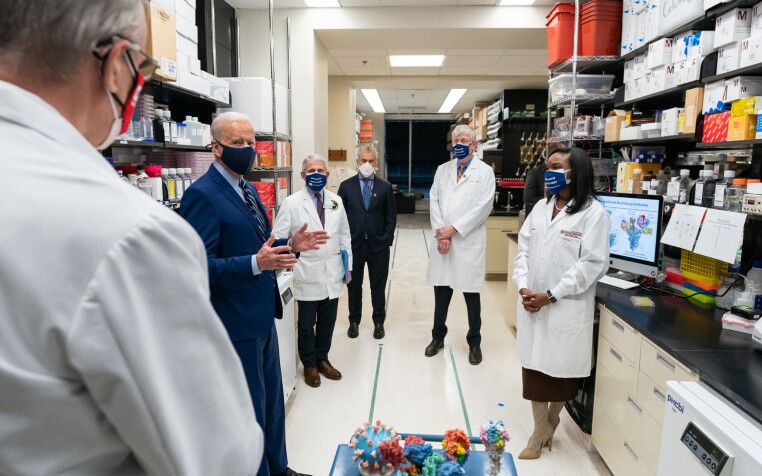Pandemic Origins Debate Spurs Competing Allegations of Political Meddling in Science

Anthony Fauci, third from left, and Francis Collins, second from right, meet with President Joe Biden during a tour of NIH’s Viral Pathogenesis Laboratory in February 2021.
(Adam Schultz / The White House)
A House subcommittee formed to investigate the origins of the COVID-19 pandemic held a hearing
The paper in question, called “The Proximal Origin of SARS-CoV-2” was published in Nature Medicine, with a related letter published in The Lancet. Subcommittee Chair Brad Wenstrup (R-OH) published a report
“Rather than journals being a wealth of information and opinions about this novel virus, of which we knew so little, they helped establish a party line that literally put a chilling effect on scientific research regarding the origins of COVID-19,” Wenstrup asserted at the outset of the hearing this week.
Rep. Raul Ruiz (D-CA), ranking member of the subcommittee, countered that Wenstrup’s probe into the potential suppression of research findings on the origin of COVID-19 “has failed to substantiate any of their claims about doctors Fauci and Collins, or even bring us close to understanding how COVID came to be.”
“I’m worried today’s hearing is setting a dangerous precedent that if Congress doesn’t like what you publish, you’ll be hauled in before a congressional committee to answer for it until they prove their conspiratorial narrative,” Ruiz said. “The fact is, Congress should not be meddling in the peer review process. And it should not be holding hearings to throw around baseless accusations, especially when there is so much work we can and should be doing to prevent and prepare for future pandemics.”
The subcommittee invited the editors-in-chief of The Lancet, Nature, and Science to participate in the hearing, but only Holden Thorp of Science agreed to participate. Thorp explained to the subcommittee how the publication process typically works but said he was not in a position to comment on the circumstances surrounding the publication of the ‘Proximal Origin’ paper, which he had no role in.
Thorp noted that Science did publish two papers that suggest the pandemic was of natural origin as well as a letter calling for the lab leak theory to be taken more seriously. He also emphasized that no government officials prompted the publication of the papers or participated in their review.
Asked about a tweet he made suggesting the lab leak theory was baseless, Thorp apologized. “I was not as careful expressing my personal opinions on my personal Twitter page as I should have,” he said.
More broadly, Thorp argued that missteps and errors in judgment that occurred during the pandemic were the natural result of scientists being “flawed human beings” and were outweighed by the scientific community’s successes.
“We did not get everything right during COVID-19 — no one did,” Thorp said. “But in 18 months, the scientific community identified the virus, determined how it spreads, and developed therapies that have had major, life-saving impact. Scientists, the scientific method, and peer review are national treasures, and I am thankful every day for all three.”


